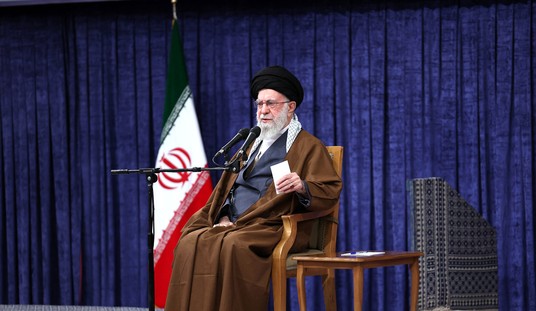The Times of Israel is reporting that rebels outside of Damascus near the area where a chemical attack killed nearly 1500 people on August 21 are telling Al-Arabiya TV that another gas attack has occurred, injuring 25. A YouTube video shows a young man having trouble breathing, but no corroborating evidence is presented.
No other major media is reporting this story, making its provenance even more suspicious. Meanwhile, UN inspectors are expected to release their report on the chemical attack in Jobar on Monday and leaks indicate that the inspectors have massive evidence that the attack was carried out by President Assad on his own people.
Foreign Policy reports:
U.N. inspectors have collected a “wealth” of evidence on the use of nerve agents that points to Syrian President Bashar al-Assad using chemical weapons against his own people, according to a senior Western official.
The inspection team, which is expected on Monday to present U.N. Secretary General Ban Ki-Moon with a highly anticipated report on a suspected Aug. 21 nerve agent attack in the suburbs of Damascus, will not directly accuse the Syrian regime of gassing its own people, according to three U.N.-based diplomats familiar with the investigation. But it will provide a strong circumstantial case — based on an examination of spent rocket casings, ammunition, and laboratory tests of soil, blood, and urine samples — that points strongly in the direction of Syrian government culpability.
“I know they have gotten very rich samples — biomedical and environmental — and they have interviewed victims, doctors and nurses,” said the Western official. “It seems they are very happy with the wealth of evidence they got.” The official, who declined to speak on the record because of the secrecy surrounding the U.N. investigation, could not identify the specific agents detected by the inspector team, but said, “You can conclude from the type of evidence the [identity of the] author.”
While homemade chem labs have been reportedly discovered in tunnels underneath rebel-held territory, if sarin was the agent responsible for the attack, it strongly suggests a government operation. Sarin gas is not easy to weaponize and launching the gas shells takes specialized equipment. Unless there is proof that the rebels were able to capture some Syrian army chemical weapons units whole, or were able to purchase them from a third party, the notion that the rebels were able to construct such sophisticated weaponry in their crude labs stretches credulity. If that’s the case, then the idea that the attack was carried out by rebels falls off the boards.
Meanwhile, crucial meetings between Secretary of State John Kerry and Russian Foreign Minister Sergei Lavrov are beginning in Geneva and Kerry has already taken what appears to be a hard line with President Assad and his assurances about handing over his stockpile of chemical weapons.
Syrian President Bashar Assad told Russian TV earlier Thursday that the country would sign an international treaty banning chemical weapons according to a Russian-backed plan and begin transferring control of its own arsenal thirty days later. A spokesperson for the United Nations told CNN that Secretary-General Ban Ki-moon has received a letter from Syria declaring its intention to join the convention.
Kerry said at the press conference in Geneva with Russian Foreign Minister Sergey Lavrov that the U.S. would still strike Syria if Assad doesn’t agree to dismantle his chemical arsenal properly.
Assad told Russia’s Rossiya-24 TV that the country agreed to hand over its chemical weapons as a result of a Russian initiative—and not in response to the threat of a U.S. strike.
“Syria is placing its chemical weapons under international control because of Russia. The U.S. threats did not influence the decision,” Assad said, according to the BBC.
Kerry is worried about 30 days? It’s going to take many months for the Syrians to hand over their entire cache of gas weapons. And that’s only if an agreement can be reached about verification and inspection — not only of chemical-weapons storage facilities but of manufacturing and testing sites as well.
Syria announced it is now a signatory to the 1997 Chemical Weapons Convention, but diplomats say that it is unclear whether Syria has fulfilled all of its obligations under the treaty. And another key Assad demand — that the U.S. foreswear the use of force — was also rejected by the secretary of State:
Secretary of State John Kerry today rejected a call from Syrian President Bashar al-Assad for the U.S. to drop its threat of force before Syria gives up its chemical weapons.
“President Obama has made clear that should diplomacy fail, force might be necessary to deter and degrade Assad’s capacity to deliver these weapon,” Kerry told reporters at the start of a multi-day negotiation with the Russians over how such a disarmament might take place.
Kerry also rejected Assad’s call for a customary 30 day period before his country submits documentation about its chemical weapons stockpiles to the United Nations.
“There is nothing standard about this process at this moment,” Kerry said. “Words of the Syrian regime, in our judgment, are simply not enough.”
I would guess in a very few days we will see just how serious Assad and his Russian handlers are about getting rid of Syria’s chemical weapons. Or, we will discover how truly naive John Kerry is. If we find “not very” in the first instance, and “too much” in the second, we’re in trouble.










Join the conversation as a VIP Member